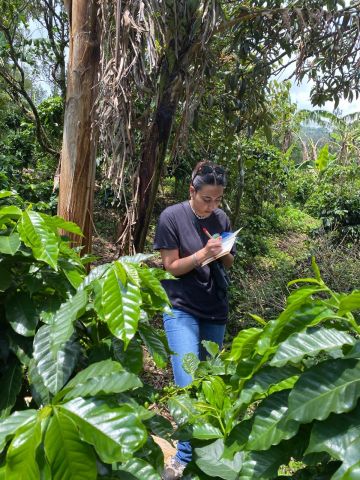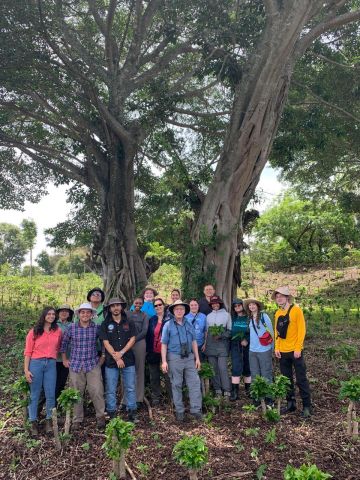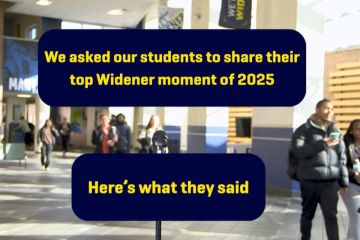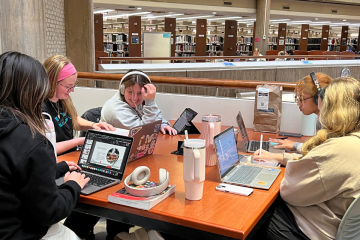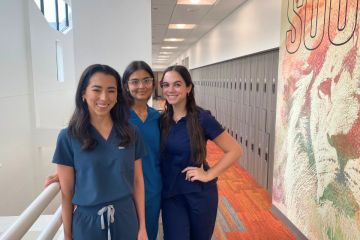Widener’s First International Internship Experience Expands Student Skills and Horizons in Costa Rica

Internships can provide valuable learning opportunities and hands-on skills for students. Recently, a group of students from majors across the university completed Widener’s first international internships.
Accompanied by Beatriz Urraca, chair of Spanish, and Stephen Madigosky, professor of environmental science and biology, students traveled to Costa Rica, where they embarked on projects in various locations within the country.
The experience allowed students to immerse themselves in a new culture, develop an appreciation for sustainability and sustainable practices, and build a variety of skills that will help them transition into successful careers. Professional connections Urraca and Madigosky have developed there through travel and research nurtured valuable relationships that helped create these opportunities for the students.
“We know people from many sectors in Costa Rica that connect with coffee in some way or another,” said Madigosky. “We know coffee farmers, roasters, exporters, engineers, and research agronomists, all of whom play an important role in the production, distribution, and sustainability of this valuable crop. We can now take the relationships we have forged and use this to benefit our students by offering them a unique experience connected with the coffee industry. They then become embedded in an important industry that has worldwide significance.”
Urraca and Madigosky take students to Costa Rica for week-long trips as part of their class “Coffee, Culture, and the Environment in Costa Rica,” but the internships were designed to be different and more intensive.
“An internship is skill based. When a student uses this on their resume or in a job application, they need to be able to translate it into skills,” said Urraca. “We worked on two types of skills- soft skills and hard skills.”
Students traveled for three to four weeks, spending the first week of the trip together at the National University of Costa Rica, where they got to work and learn alongside business students and faculty there. The program focused on soft – or interpersonal – skills, such as teamwork, problem solving, adaptability, and time management.
After orientation, students went to separate homestay placements, where they immersed themselves in Costa Rican culture and adapted to new customs. They worked in different small businesses, learning hard skills in an agricultural society. Hard skills are more technical in nature and learned through education and training.
Flourishing on a farm
Jenna Waldron ’25 found a farm full of vibrant plants and people when she arrived at her homestay location at Finca Lluvias de Gloria, which translates to “Rains of Glory Estate.”
“The farm was an absolute testament to its name,” said Waldron. “There were plants flourishing everywhere. It was the rainy season, and I remember my homestay mom, Doña Hermida Porras, being so happy about that. Every plant there was touched by her and planted by hand.”
The farm grows a variety of plants and trees, including coffee, bananas, and other plants native to the area. The internship project assigned to Waldron and her partner involved the creation of a guide to plant life on the farm.
“We were working on a booklet for tourists and other people who stop by the farm to be able to learn about it, what the farm stands for, and why Doña Hermida Porras plants the things she does,” said Waldron. “We had different categories such as barrier plants, rooted plants, fruits, and more, and the purpose that they each serve.”
By the end of their stay, they had catalogued over 40 plants, and Waldron hopes one day their work will get translated into multiple languages.
She learned first-hand the purpose that plants can serve aside from producing blooms or fruits. One major way she helped on the farm was planting a natural barrier of over 200 native trees along the property’s edge to keep out cattle from a neighboring farm.
“There are no short cuts here. [Costa Ricans] tend to go all in and give their all for everything, and you can see how much care and thought goes into it,” she recalled.
Waldron also learned how self-sufficient a thriving farm can be. While planting trees, she had a reaction to ant bites and Doña Hermida Porras had just the solution.
“She immediately went into her cabinet of all her handmade medicinal items from the plants on the farm,” she said. “Family, food, medicine, she had everything she needed on the farm.”
Practicing with peers
Naomi Knight ’25 ’27 spent the full internship at the National University of Costa Rica, where she did “a little bit of everything” from setting up an environmental fair to volunteering at the university’s research coffee farm, in addition to her main internship goal- to examine how soft skills translate across cultures.
“The soft skills I was looking at were communication, teamwork, adaptability, creativity, and problem solving. My task was to come up with various games for a curriculum for the students in the school of business administration at the National University,” Knight said.
Knight led the students in a series of games that put all those skills to the test, some made even more difficult by the language barrier.
“A lot of Costa Ricans really do want to practice their English, and they usually have to practice with another primary Spanish speaker instead of a primary English speaker. So, I was able to use that to my advantage and have it be a two-way street for me to learn Spanish from them and them to learn English from me,” she explained.
She used free time during her homestay to explore the area by taking a cooking class, zip lining, visiting markets with locally grown produce, and more. She also found it valuable to unplug from her phone.
“One day we lost power for about eight hours, and I was just there listening to the rain and looking outside and enjoying talking to the people there. It was really grounding to be able to do that,” she said.
Making it possible
Funding and support for the trip came largely from the IDEAS Program, a program of the U.S. Department of State with funding provided by the U.S. Government and supported in its implementation by World Learning. The IDEAS Program is designed to increase and broaden American student mobility in support of U.S. foreign policy goals.
Urraca and Madigosky were awarded the IDEAS grant, which helped make the trip possible. Urraca recently represented Widener at a grant winners’ symposium in Washington, D.C., where she was able to exchange ideas with other grant recipients and with various agency officials at the Department of State.
Students received funding from the Office of the Provost, and some received additional support through Experience MORE!, a donor-funded program that allows students in the College of Arts & Sciences to seize opportunities in meaningful internships that would otherwise be unpaid or underpaid.
Carrying through life
Both Waldron and Knight aspire to become professionals in the medical field, and they’re already finding ways to apply the skills and knowledge they gained into their lives and future careers.
“Healthcare has no boundaries. Everyone is going to need to interact with healthcare no matter where you’re from, what race you are, or what language you speak,” said Knight, a psychology major on the pre-physical therapy 3+3 track with a minor in African American studies.
Waldron, a biology major and psychology minor in the pre-dental program,
echoed Knight’s sentiment. “Being a dentist, you need to have good interpersonal skills and understand where people are coming from and meet them where they’re at,” she said.
Waldron also gained a new appreciation for sustainability and sustainable practices.
“I was there learning and thinking about what I can bring back to school. It made me more conscious about my consumption. They’re so resourceful there and I can be resourceful in my life too. It was just an experience I will carry with me forever.”

